Vol. 24 No. 26 - March 23, 2020
Features
Truman Establishes Altered Guidelines for the Spring Semester
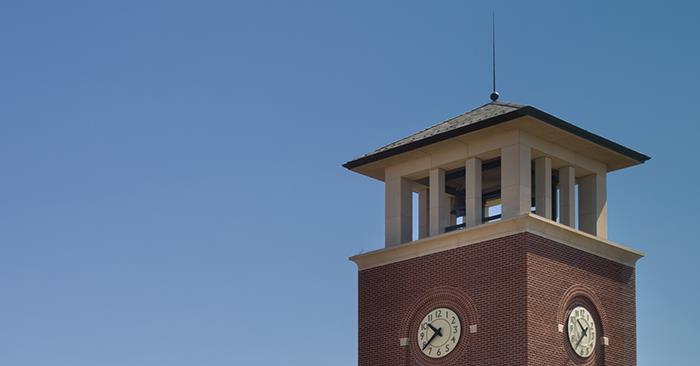
Truman will operate under some altered guidelines during the spring semester.
In-person classes remain suspended for the spring semester. CDC recommendations for social distancing will be followed, and high-touch surfaces and restrooms will be cleaned and disinfected multiple times throughout the day.
Following Gov. Parson’s March 21 directive, Truman suspended its previously scheduled move out open to all on-campus residents between March 23-30. In order to be compliant with the governor’s directive, CDC guidelines and advice from of the Missouri Department of Higher Education and Workforce Development, the University is developing a move-out plan that should be available to all students by April 7. A pilot program is currently being implemented with a very small number of students who are being allowed to move out of their on-campus residence based on the order in which their original request was received.
All in-person student services, except for the Health Center which is operating under CDC guidelines, are suspended for the rest of the spring semester, as are in-person meetings with faculty and staff and the use of labs and studios. All in-person student services that have been suspended will be offered in alternative delivery formats. As such, all academic buildings, Pickler Memorial Library, the Student Union Building, the Student Recreation Center and Pershing Arena are closed to students and the general public. Food service is available on a to-go basis only for on-campus students with a meal plan.
The University is working on a solution to credit students for unused portions of meal plans and housing contracts. Details will be sent later to students with housing contracts. This may take some time since there are many individual situations, and federal financial aid guidelines restrict how and when credits can be made to student accounts.
Students with scholarship-hour obligations will retain their scholarship funding and will not be required to fulfill any more hours this semester. Scholarship students who would like to continue their employment should contact their supervisors for available options. Students who have a federal work-study job (which is only about 200 students on campus) will be compensated for the remainder of the semester based on the number of hours they were scheduled to work. Federal work-study students who would like to continue their employment will need to coordinate with their supervisor. Students working for the University and receiving institutional pay who would like to continue their employment must contact their supervisors. Due to altered services on campus, where student workers are needed has changed. Students are encouraged to regularly check trupositions.truman.edu if they need employment.
A decision regarding commencement will be made by March 31. Should the need arise, the University will explore rescheduling commencement. Graduates will also have the option to participate in a future commencement ceremony if they are unable to attend any rescheduled event. The Registrar’s Office is attempting to convert the graduation fair, originally scheduled for late April, to an alternate format and will notify May graduates when instructions are ready. Questions regarding purchased materials for commencement should be communicated directly to the merchant. Degrees will be conferred at the regular time regardless of when commencement ceremonies take place.
During these extraordinary times, Truman remains committed to providing a quality educational experience for all of its students. Faculty members have made adjustments to complete their courses through alternative instructional methods. While some services may be altered or disrupted, Truman is making every effort to keep its students informed and their academic careers on track. At this time, there are still no known cases of COVID-19 among any Truman students, faculty or staff. Updates will continue to be posted to trualert.truman.edu in addition to regular campus emails.Academic Options Eased, Expanded for Spring
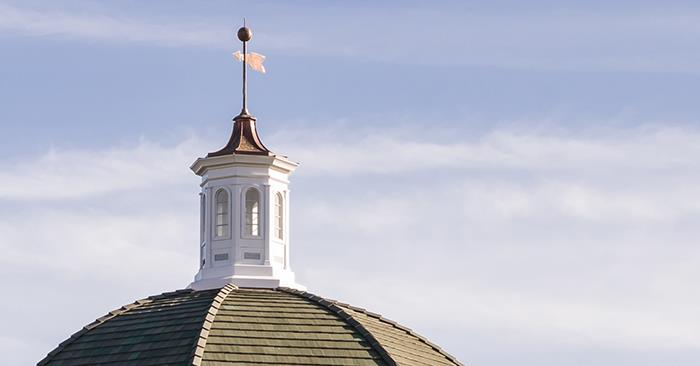
Truman administrators and faculty recognize the increased difficulty, stress and uncertainty these extraordinary circumstances pertaining to the COVID-19 virus are likely causing students. Patience and understanding are appreciated as the University has shifted face-to-face learning to alternative means, adapted advising and tutoring, and worked out other logistics related to student life and learning. Truman cares about its students, and in an effort to ease the transitions that are necessary at this time, the University will provide the following opportunities to students during the spring, 2020 semester:
• Extend the final drop date (with a W) for individual courses to the last day of classes, May 1.
• Allow students to convert any course to Pass/Fail grading until 8 a.m. May 14, the day after semester grades are posted.
• Allow all courses graded as Pass/Fail to be used to fulfill degree and program requirements if a grade of P (pass) is earned; however, individual programs such as Nursing and some graduate programs may choose to require a C or better for fulfillment of degree requirements and will notify their students if this is the case.
• Allow a grade of P (pass) to be sufficient for degree progress and to fulfill prerequisites. In the case where a grade of C or better is required for prerequisite fulfillment, a student may select Pass/Fail grading but will not fulfill the prerequisite if the recorded grade is a D unless approval is granted by the department chair.
• Inclusion on the President’s and Vice President for Academic Affairs’ Lists based on recorded grades prior to the Pass/Fail conversion.
• For the 2020-2021 academic year, commit to taking a flexible, understanding approach to academic standards appeals, standard academic progress appeals (federal financial aid), and scholarship renewal appeals (Truman financial aid).
Below is a list of questions students might have regarding these opportunities, and others will likely arise. These questions will be posted on trualert.truman.edu and will be frequently updated.
FAQs for Students Regarding Spring 2020 Grading Policies
How do I change a course to Pass/Fail grading?
A tool in TruView is being created to make these changes. Students will be notified when this option is available. You will have the option to select/deselect the Pass/Fail option until 8 a.m. May 14.
How does the Pass/Fail grading process work?
Faculty will record the letter grade earned. The Registrar’s Office will convert it to Pass if the recorded grade is a D or higher or to Fail if the recorded grade is an F. The recorded grade will be used for prerequisite fulfillment if a course requires a prerequisite of a grade of C or better. The recorded grade will be used for determining the President’s and Vice President for Academic Affairs’ Lists.
What will show on my transcript?
If you select to drop your course before the last day of classes, you will receive a “W” on your transcript for this course. If you select Pass/Fail grading, your transcript will display a “P” if you earn a letter grade of D or higher. A grade of “Fail” in Pass/Fail grading will display an “F” on your transcript. If you choose Credit/No Credit grading, a letter grade of D or better earns Credit (Y appears on the transcript); a letter grade of F does not earn credit (Z appears on the transcript).
How do the different options impact my GPA?
If you select to drop a course, the “W” will not impact your GPA. If you select Pass/Fail grading, the grade of a “P” (Pass) will not impact your GPA. A grade of “F” (Fail in Pass/Fail grading) will be calculated into your GPA as scoring zero (0) honor points for that course, behaving in the same way as an “F” issued under an A-F grading scheme. If you choose the Credit/No Credit grading option, neither Credit grades (Y appears on the transcript) nor No Credit grades (Z appears on the transcript) affect your GPA.
What is the difference between the new Pass/Fail grading option and Credit/No Credit grading that we can select any semester?In both options, if you earn a letter grade of D or better you get a Pass or Credit grade and neither option counts towards your GPA. In the case of a letter grade of an F, a “Fail” counts as zero (0) honor points and will count against your GPA while a “No Credit” Z grade does not impact your GPA. As outlined above for this semester, any courses that you choose the Pass/Fail grading option and earn a “Pass” will fulfill degree and program requirements, count as sufficient degree progress, and fulfill most prerequisites. This means you will receive full credit for those courses. (A few degree programs will not permit this option and will notify their students separately.) Maintaining sufficient degree progress is important for some scholarships and financial aid; the Pass/Fail option allows you to keep all of the financial aid that has been awarded to you for the current semester. Credit/No Credit grading can only apply to “free electives” and cannot count towards many degree requirements – see FAQ for What is the Credit/No Credit Policy. There is a limit of the number of Credit/No Credit courses you can claim in a semester and over the course of your college career. Credit/No Credit courses cannot be repeated. Credit/No Credit courses do not count for sufficient degree progress and in your full-time load for some scholarships and financial aid, which may mean you will be required to return those forms of aid. The Credit/No Credit option is available for students to select until March 27. No fee will be assessed for the change to Credit/No Credit. For most students looking for an option other than the standard A-F grading scheme, the Pass/Fail grading option will be a better choice than Credit/No Credit. However, your faculty advisor or a CAE advisor (advise@truman.edu) can help you make this decision if you are unsure.
Does dropping my course or selecting Pass/Fail grading impact my financial aid?
Dropping below full-time hours (12 credit hours) may impact your financial aid. Selecting Pass/Fail grading does not impact your financial aid. Credit/No Credit grades can impact Veteran Affairs aid and have other limitations on degree progress and courses that it can apply to.
How might converting my classes to Pass/Fail impact my plans to attend graduate or professional school?
An advisor (faculty advisor or CAE advisor) can help you answer this question. However, many universities are implementing similar policies for the Spring 2020 semester.
Who can I talk to about what makes the most sense for me?
You can contact the Center for Academic Excellence (CAE) at advise@truman.edu or by phone 660.785.7403. Your faculty advisor can also serve as a resource. Email is a good way to contact your advisor to find out their office hours and the best way to communicate with them.
Will my professor know if I select Pass/Fail grading?
No, your professor will enter the letter grade you earned in the course. The conversion to a Pass/Fail grade will occur in the Registrar’s office after letter grades have been entered.
Will there be a fee to change to Pass/Fail?
Fees are not assessed for choosing Pass/Fail.
Do ordinary fees apply right now for dropping a course or for changing to credit/no credit?
Fees will not be assessed for dropping beginning March 23 through May 1 or for changing to Credit/No Credit through March 27.
What if I have changed a course to Credit/No Credit grading and would like to select Pass/Fail grading?
Pass/Fail grading will override Credit/No Credit grading if you have selected both options for your courses. You are also welcome to contact the Registrar’s Office at registrar@truman.edu to remove the Credit/No Credit grading.
Can I change a first-block course to Pass/Fail grading?
No, this option is only available for courses that are currently in session (Full-term Spring courses and Second-block Spring courses).
What is the Credit/No Credit Policy?
CREDIT/NO CREDIT – To provide students the opportunity to broaden their experiences, Truman allows students to enroll in a limited number of classes on a Credit/No Credit basis. Forms are available in the Registrar’s Office. The following Credit/No Credit guidelines apply.1. A student may complete “free elective” classes using the Credit/No Credit grading option. “Free electives” are those courses that are not used to fulfill requirements in the Liberal Studies Program, in the student’s major program (including required support), in the additional foreign language component for the BA, in the additional science component for the BS, minor requirements, departmental honors requirements, or honors scholar requirements. A student may not elect the Credit/No Credit grading option in courses that cannot be used as “free electives” (COMM 170, ENG 190, MATH 156, MATH 157, MATH 186, and STAT 190). Required English courses for international students may not be taken as Credit/No Credit.2. A student may complete a course that is being used to fulfill the writing-enhanced requirement, the Missouri Statute requirement, the 63 required credits of LAS coursework, the 40 required credits of 300+ level undergraduate coursework, and/or the cumulative credit requirement using the Credit/No Credit grading option if that course is not being used to fulfill any other requirements in the student’s program.3. Credit standing is achieved by a “D” grade or above, while failing a course results in No Credit.4. A student may take up to five (5) credits per semester as Credit/No Credit. Seniors may request a waiver to take two courses (up to 8 credits) in a single semester. The request must be submitted in writing to appeals@truman.edu.5. Up to 12 credits of Credit/No Credit may be counted toward graduation.6. A student may change to or from a Credit/No Credit grading system by the last day allowed to drop the course.7. With a Credit standing, the student receives credit for the course, and recognition of passing the course appears on the student’s transcript.8. With a No Credit standing, the student does not receive credit for the course though the student’s transcript shows that the student attempted, yet no credit was received, for the course.9. Courses taken under the Credit/No Credit grading option do not affect the student’s grade point average.10. Courses taken under the Credit/No Credit grading option cannot be repeated.11. During the semester, the student, the student’s advisor, the instructor, and the Registrar’s Office know that the student is taking the course on a Credit/No Credit basis.All students should consult their advisors prior to deciding to take any course Credit/No Credit. Pre-Education students are advised that professional education courses cannot be taken Credit/No Credit. Students planning to pursue the MAE degree should contact the Certification Office in the Department of Education for specific information. Courses taken Credit/No Credit do not fulfill requirements for load considerations by the Veterans Administration if the final grade assigned is No Credit.Music Student Gets Creative for Recital
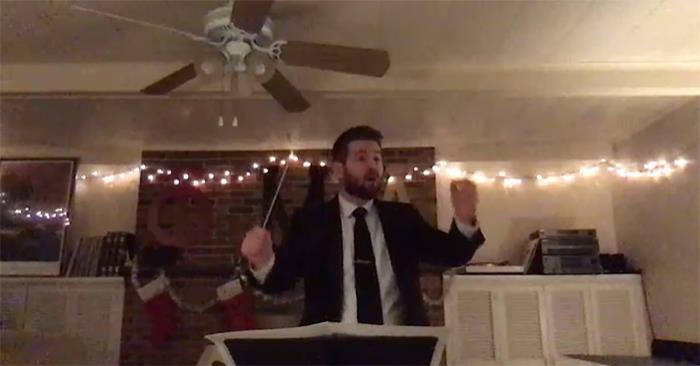
Graduate student Kyle Rieger tends to be more pragmatic than positive. He likes things to go according to plan, and when they don’t – by his own admission – he might not be the most positive person in the room.
When it was announced Truman would be suspending in-person classes for the remainder of the spring semester Rieger, who is completing a Master of Arts degree in conducting, immediately thought of all the things he would be missing, such as concerts, performances, making music with groups of friends and, most notably, his conducting recital. After the initial shock wore off, Rieger decided a global pandemic may have changed his plans, but it didn’t have to stop them. He posted on Facebook that he would host his recital live later that evening on the platform.
“Instead of sitting around and moping, I wanted to celebrate the work that had already been done,” Rieger said. “I put on my concert tuxedo, rearranged my living room and cued up all of the music we would have played live in an attempt to make the best of the situation.”
While it was not what he had been envisioning for years, Rieger’s recital can be considered an early success story for the now altered semester. At points during the live presentation more than 60 people were watching, and the recording has been viewed hundreds of times.
“The support I’ve received has been almost overwhelming,” he said. “I’ve received support and thoughtful comments from fellow music students, professors, alumni, administrators and family, and it has meant the absolute world to me that so many people would tune-in and share their well-wishes.”
Rieger will complete his Master of Arts degree in conducting this spring, his second Truman degree after receiving a Bachelor of Music degree in composition in 2018. Technically, he will still be a student in the fall as he is scheduled to earn his Master of Arts in Education degree with a concentration in music in December. Since he will be participating in a student teaching internship with the Lindbergh School District in the St. Louis area, his time on campus has essentially come to an end. Although things are not following the normal plan, Rieger is doing his part to stay positive.
“In situations like this, where the plan gets completely thrown out the window, you’re almost forced to turn to positive thinking for risk of driving yourself crazy,” Rieger said. “I remind myself a lot about why Truman and other institutions across the country made the right call in suspending in-person meetings and events, while trying to find as many silver linings and hidden opportunities as I can. Plus, I don’t think there’s ever been a better time than right now to be thankful for what you have.”School of Business Honors Kerby with Tributes, Donations
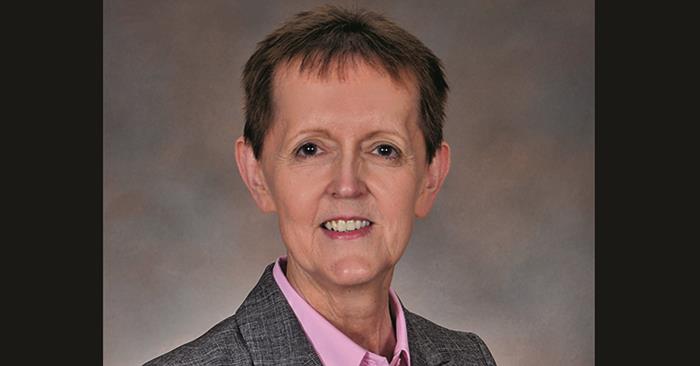
Deb Kerby dedicated much of her life to Truman State University, and the School of Business continues to honor the former dean.
A native of northeast Missouri, Kerby earned a bachelor’s and master’s degree at the University before receiving a second master’s and Ph.D. at other institutions. She joined the accounting faculty in 1982 and spent the following 38 years working with students and improving the University. She was the dean of the School of Business at the time of her passing in January 2020.
Kerby was humbled by plans to promote the Kerby Family Business Excellence Fund in honor of her pending retirement. She impacted many lives through her lifelong commitment to the University and its students. She created the fund to: enhance technology and learning opportunities for students, faculty and staff; provide scholarships; and support faculty by providing resources to attend academic conferences and additional opportunities for research.
The Kerby Family Business Excellence Fund is designed to maintain and advance the exemplary reputation of the School of Business and Truman State University. Through the endowed fund she created, Kerby’s impact will continue in perpetuity.
Memorial gifts can be made to the Kerby Family Business Excellence Fund here.
The School of Business is also collecting stories to highlight the tremendous impact Kerby had on those who knew her. The stories will be shared with her family and possibly in future tributes on the School of Business website and Pedigree magazine. To share a memory or a story about Kerby, click here.Nationally Competitive Scholarships and Fellowships Available

Each year Truman nominates students for national fellowship opportunities who have shown outstanding academic performance and exceptional service accomplishments. The application process is very rigorous and highly competitive, but the University provides support as students prepare for and then apply to these prestigious scholarships.
Listed below are several of the major national fellowships and their websites. More information about these fellowships is available at www.truman.edu/majors-programs/more-learning-opportunities/fellowships.
For Graduate Studies
Fulbright Grants
Research grants and teaching assistantships for a year abroad
Rhodes Scholarships
Grants for two years of study at Oxford University
Marshall Scholarships
Awards for two years of study in any British university
Mitchell Scholarships
One year of graduate study or research in Ireland or Northern Ireland
Gates Cambridge Scholarships
Awards for an advanced degree or second bachelor’s degree at the University of Cambridge
For Undergraduate Studies
Goldwater Scholarships
Up to $7,500 annually for tuition, fees, books, room and board for science and mathematics majors
Harry S. Truman Scholarships
For senior year and post-graduate study leading to a career in public service
Udall Scholarships
For students interested in careers related to environmental issues or for Native Americans and Alaskans interested in careers related to health care and tribal public policy
Carnegie Endowment Junior Fellowships
For students interested in international affairs to work as research assistants to the Endowment’s senior associates in Washington, D.C. for a full year
Boren Scholarships
To study abroad in areas of the world that are critical to U.S. interestsHelpful Tips for Studying and Working Remotely
 The suspension of in-person classes caused an abrupt shift in the academic semester. Truman will continue to make adjustments whenever possible in order to accommodate students and faculty alike. The Writing Center is already providing online help to students, and the Tutoring Center should be available to do the same by March 24.
The suspension of in-person classes caused an abrupt shift in the academic semester. Truman will continue to make adjustments whenever possible in order to accommodate students and faculty alike. The Writing Center is already providing online help to students, and the Tutoring Center should be available to do the same by March 24.
Truman’s virtual desktop environment is available from personal devices to provide access to the same software and resources available in the University’s public computer labs and classrooms. These can be accessed off-campus. The view client also gives access to network drives and library resources. Instructions for installing the view client can be found at secure.truman.edu/its-s/viewclient, or students can just access the software using their browser and this url: https://view.truman.edu.
Email, cloud apps and collaboration platforms – such as Google – should be accessible through a regular home internet service.
ITS also suggests the following tips for working remotely, or click here for more information:
• Make sure you know your passwords.
• Ensure your devices are secure and you have a process for backing up any local data.• Gather the supplies you need to effectively do your job and communicate with others. These may include:microphones and speakers for conference calls (if your computer does not have them built-in)power adapterskeyboard and mouse (if you’ll be working from a laptop).• Test your home Internet connection.
• Consider the files and applications you’ll need to use, and test them before beginning remote work.
• At home, try connecting to all the apps/sites that you use on a regular basis, such as:
TruView
Blackboard
Google G-Suite
Microsoft Exchange
View Client
Zoom
Announcements
University Bookstore Makes Adjustments for Students and Faculty
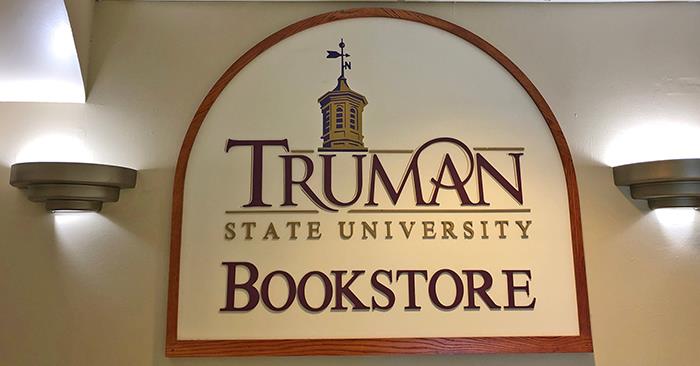 The University Bookstore is making the following adjustments during the spring semester.
The University Bookstore is making the following adjustments during the spring semester.
Rental Returns
Rental grace periods will be extended to 15 days. This does not change current Last Day of Finals date which is the due date for student check-ins. Grace period extension will allow more time for in-transit rental check-ins to be processed before non-return collateral charges process. Free shipping labels are available to all U.S. rental patrons until midnight of the due date. If additional extenuating circumstance arise, or no opening due date has been set, alternative options exist for extended Last Day of Finals and placing all collateral charges on hold.
Free Shipping
The University Bookstore is offering free shipping for all online purchases.
RedShelf Update
Follett is partnering with RedShelf to provide free digital access to students. Students can find the link on the bookstore website and must use their Truman email account to get access.
Lumen
Live classes may shift to Lumen Waymaker or OHM courseware at no cost for the remainder of the term and free services to support a successful transition. Instructors can learn more here.
Graduation Apparel
The deadline to order graduation apparel has been extended through April 2. A decision on graduation ceremonies will be made by March 31.Educator of the Year Finalists Announced
Student Government has released the finalists for Educator of the Year, Research Mentor of the Year and Faculty Wellness Honoree of the Year. Winners will be announced April 17 on the Student Government Facebook page, Instagram and Twitter.
Educator of the Year Finalists
William Alexander, Biology
Joseph Benevento, English and Literature
Bill Miller, Chemistry
Sarah Mohler, English and Literature
Paul Parker, Political Science and International Relations
Michael Rudy, Political Science and International Relations
Susan Scheurer, Mathematics
Shinya Uchida, Classical and Modern Languages
Research Mentor of the Year Finalists
Brett Berke, Biology
Cassidy Dobson, Chemistry
Emily Olsen, English and Linguistics
Faculty Wellness Honoree of the Year Finalists
Nancy Daley-Moore, Health Science
Eric Dickson, Music
Roberta Donahue, Health Science
Patricia Hanson, Communication Disorders
Wendy Miner, Education
Melissa Passe, Clinical Director of the Truman Speech and Hearing Clinic, Communication DisordersSummer Registration Open
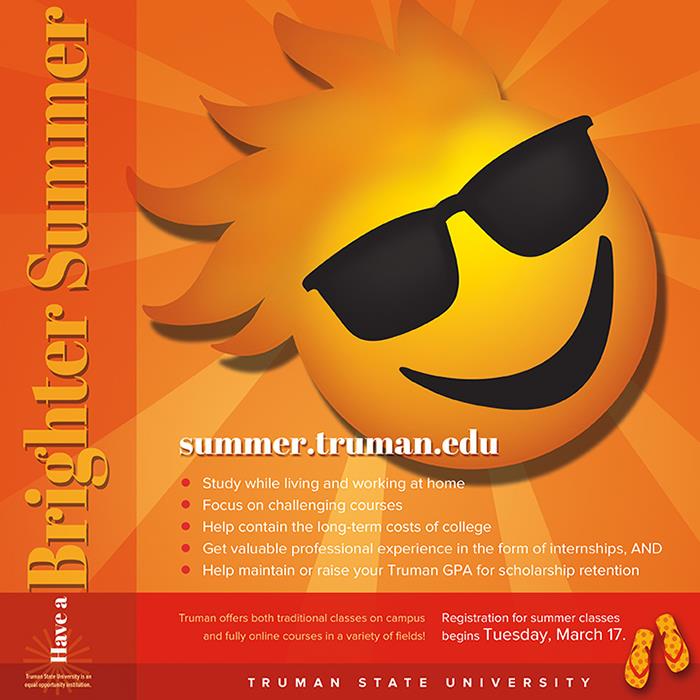 At this time there are no plans to cancel summer or interim sessions. There are also many courses offered during the summer that are already online. Departments are moving quickly to convert several of the existing in-person courses to online as a contingency measure. Students can search for online courses in the Open Course List. However, some of the most recent additions are not yet listed as online in the system. To identify these courses that are in transition in the system, look for special notes indicating their pending status. Information on summer registration, change deadlines and withdrawal deadlines can be found here.
At this time there are no plans to cancel summer or interim sessions. There are also many courses offered during the summer that are already online. Departments are moving quickly to convert several of the existing in-person courses to online as a contingency measure. Students can search for online courses in the Open Course List. However, some of the most recent additions are not yet listed as online in the system. To identify these courses that are in transition in the system, look for special notes indicating their pending status. Information on summer registration, change deadlines and withdrawal deadlines can be found here.
Big Event Cancelled
The Big Event, originally scheduled for March 28, has been cancelled. As with other Truman-related events during the spring semester, the decision was made in the interest of the safety and well-being of the community. Area residents who requested assistance through the Big Event have been notified, as have all volunteers. The SERVE Center plans to renew the event next spring.Fall 2020 Room Lottery Updates
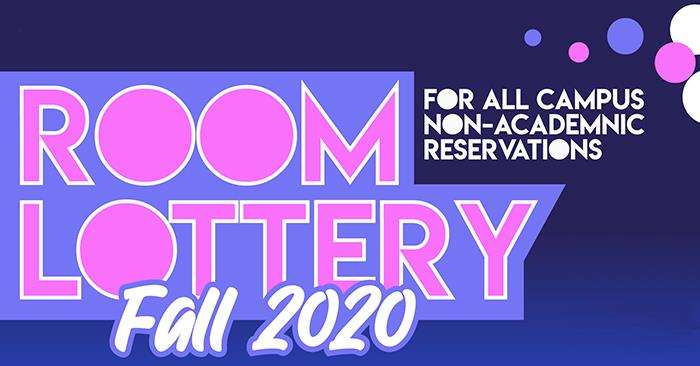
Due to the suspension of in-person classes and events on campus, the fall 2020 room lottery is operating in a slightly modified format. It will now start March 23. Forms and information are available here. Anyone who plans to make a request can complete forms in their entirety and submit them via email to union@truman.edu.
Any forms received between March 23 and April 2 at 5 p.m. will be considered for priority scheduling. Forms and requests for fall 2020 can and should still be submitted after April 2, however, they will be processed on a first-come-first serve basis after all requests received during the priority timeframe have been completed.
Because the reservation office is currently without student help, there may be a delay before organizations are notified. It should be available by June 1, but patience at this time is appreciated. For questions, email union@truman.edu.OSR Offers Summer Research Support

The Office of Student Research is now accepting applications for conference travel as well as grants-in-aid scholarship and research (GIASR) for summer 2020.
Conference travel scholarship applications are for students presenting the results of their research or creative scholarship at a conference taking place July-December 2020. Students must have completed or be currently involved in a faculty-mentored research experience and plan on presenting at the conference. The scholarship will cover up to $500 of conference registration, lodging and travel expenses.
GIASR applications are available for research and creative scholarship conducted in summer 2020. Grant applications may request up to $750 and can cover student stipends, supplies and travel to conduct research.
Complete guidelines for the conference travel scholarship and GIASR applications can be found at the Office of Student Research website. Applications for both funding opportunities are due by 11:59 p.m. April 9. Questions regarding the applications can be directed to osr@truman.edu.Public Relations Internship Available for Fall
The Truman Public Relations Office is now accepting applications for the fall 2020 internship.
Interns work approximately 32 hours per week and can choose to receive between six to nine credit hours. To maintain full-time student status, interns take two three-credit classes in addition to the internship credit hours. A small stipend is also included.
Primary responsibilities of the intern include assisting with the production of the University’s online weekly newsletter, helping with social media and video projects, and contributing to the Truman Review alumni magazine. The intern will also help with special events throughout the semester, write press releases and fulfill other office tasks.
Applicants should have a strong background in writing and editing. Communication majors are encouraged to apply, with special consideration given to candidates with knowledge of Associated Press Style. Applicants must have the flexibility to work 32 hours a week.
To apply, send a resume, an advising transcript, two writing samples and contact information for two on-campus references to pr@truman.edu or mail to the Public Relations Office, McClain Hall 202 no later than March 27. For questions about the internship, email pr@truman.edu.Upward Bound Seeking Staff for Summer Academy
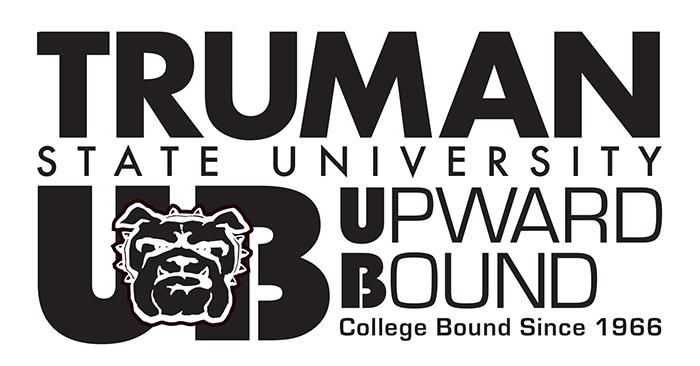
The Truman Upward Bound Project is currently seeking residential mentors, a night monitor, media advisor, photographer, professional counselor and life sciences instructor to work with area high school students while they participate in a six-week, on-campus college simulation. This a great transformative experience for upper-level Truman students. These paid positions provide high-impact learning experiences to gain valuable on-the-job training, build a resume and develop non-cognitive skills necessary for future employment. Apply here.TruCare Welcomes All to Volunteer
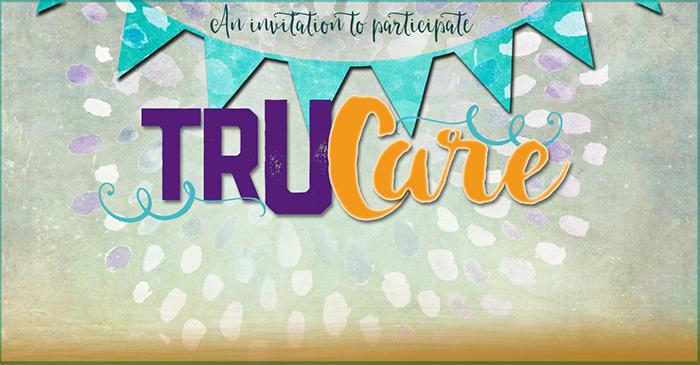
The monthlong TruCare service initiative is taking place throughout March, giving everyone with a Truman connection an opportunity to show how dedicated the University is to service.
TruCare is an international service initiative where the Truman community volunteers locally to make a difference globally. Designed as a way for alumni and friends to share in the spirit of the Big Event, TruCare allows anyone with a Truman affiliation to count service hours completed from March 1 through midnight April 1 as part of a cumulative total.
Students, faculty, staff, alumni and friends of the University can participate by simply logging any service hours completed during that time on the TruCare website. Hours can be logged individually or by student organizations. Hours completed during the Big Event will also be counted. The grand total will be announced in April.
Last year’s campaign saw 1,059 members of the Truman community contribute 10,265.5 hours of service. Projects took place in 36 cities across 19 states and included serving at food pantries, animal sanctuaries, community kitchens, parades, resale shops and safe houses.
TruCare is sponsored by the Truman Alumni Association. For questions about the program, contact Stacy Tucker-Potter, director of engagement.Compost Project Offers Products

The Truman Compost Project has screened, aged compost available for sale to the public. Bulk compost is priced at $35/cubic yard and can be loaded directly to a truck or trailer. Delivery is also available in the Kirksville area.
The Compost Project collects food scraps from campus dining halls, diverting this waste from the landfill, then composts the material with sawdust and horse manure from the University Farm to produce a rich soil amendment. Email compostproject@truman.edu for more information or to place an order. To learn more about the project visit compost.truman.edu or follow it on Facebook.Grant Writing Course Scheduled for Fall

Grant Writing Across the Disciplines, PD 541/541G, is available for enrollment next fall for students, faculty and community members.
The primary objective of the course is to teach students about the process of writing successful grant proposals. As part of the course, students collaborate with the instructor on the development of grant proposals for submission. This is an excellent opportunity for students and professionals to develop a valuable skill.
Sections are available at both the graduate and undergraduate level, and there are no prerequisites. The class meets live online Wednesday nights from 6:30-8:30 p.m. from Aug. 26 through Nov. 11.
Contact the Institute for Academic Outreach at institute@truman.edu or 660.785.5384 for more information.
Notables
Notables
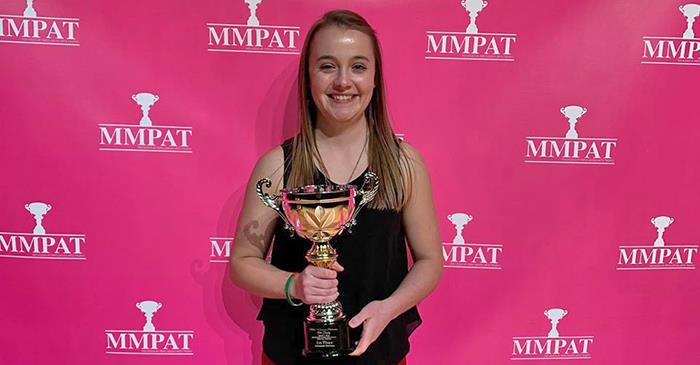
Hannah Gallamore, a graduate percussion student, received the Grand Prize at the 13th Annual Missouri Percussive Arts Marimba Competition, collegiate division. The competition took place March 6-7 at the Cowan Civic Center in Lebanon, Mo. Guest adjudicator for the event was internationally renowned marimba artist Svet Stoyanov. Gallamore competed against students from throughout the Midwest hailing from academic institutions such as Indiana, Illinois, Kansas, Missouri, the University of Missouri-Kansas City and Missouri State.Students Ben Smythe (MAE history), Alexandra Miller (BA history) and Tucker Broadbooks (BA history) represented Truman at the Missouri Conference on History in St. Louis, March 12, by participating in a panel entitled “New Perspectives on the Presidency of Harry Truman.” The panel was chaired by Jason McDonald, assistant professor of history. Smythe presented a paper entitled “Defying Defeat: Harry Truman and the Presidential Election of 1948,” which was based on research undertaken on a graduate course with McDonald in spring 2019. The presentations delivered by Miller—“Truman the Historian: An Investigation of Foreign Policy in Israel”—and Broadbooks—“Truman and Hoover: Relations between the White House and the FBI during the McCarthy Era”—were both based on archival research completed by them during internships at the Harry S. Truman Presidential Library and Museum in Independence, Mo., in summer 2019.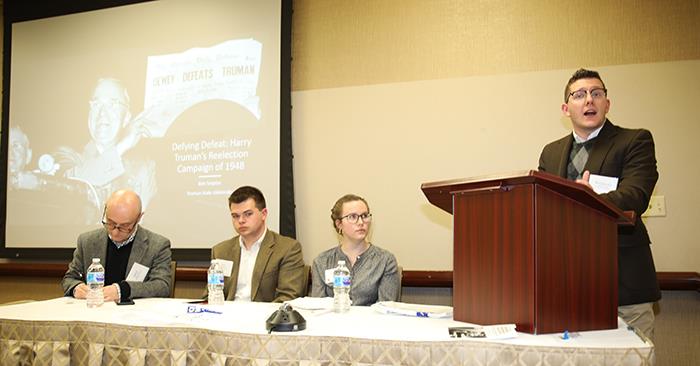
Scholarship Opportunities
Purdy Emerging Leaders Scholarship
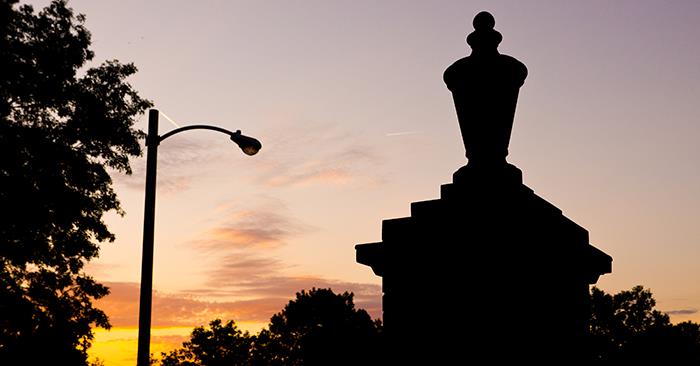
The Missouri Scholarship and Loan Foundation will offer the Purdy Emerging Leaders Scholarship, named in honor of Allan Walker Purdy.
Purdy was born in 1914 on a farm near Macon and was the first in his family to attend a four-year college. He worked in the University of Missouri’s College of Agriculture before becoming the campus’s first director of scholarships and student financial aid.
The scholarship is designed to provide merit-based scholarships to emerging leaders who are outstanding students and who have a need for additional resources for higher education. The scholarship amount can vary based on an applicant’s circumstances. The general range will be $1,000-$5,000 based on expected family contribution (EFC), unmet need and other factors.
Applicants must be a Missouri resident, typically a 2.5 or higher cumulative GPA, a U.S. Citizen, attending a Missouri public four-year university or the State Technical College of Missouri, and be a sophomore, junior or senior in college. Deadline to apply is June 30, 2020. Applications should be submitted online through Scholarship Central at moslf.org. To access more information about this scholarship, click here, or contact the Financial Aid Office at 660.785.4130.